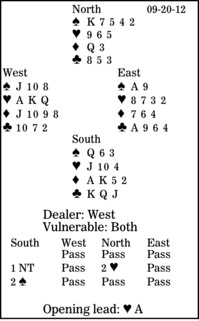Bridge column, September 20: If the points point, take that road

In this example, South ends in two spades. West cashes his three top hearts, then shifts to the diamond jack. How should South continue, given the auction that started with three passes? If South had been the dealer and the auction had stayed the same, would that have made any difference?
When South opened one no-trump, North correctly retreated to spades. Here, North bid two hearts, showing five or more spades and zero or more points. South rebid two spades as requested, and North passed because he had no thought of game. If you do not use transfer bids into the majors, take them up! And ignore transfers into the minors unless you are in a regular partnership, because they almost never come up.
South has four top side-suit losers: three hearts and one club. Needing to restrict his trump losers to one, he must find an opponent with ace-doubleton, lead through that opponent, then play low from both hands on the second round to bring that ace down. Who has the spade ace?
In the three-pass auction, it must be East. West had nine points in hearts. With the spade ace as well, he would have opened the bidding. But even if South had been the dealer, East would be more likely to have that ace.
So, South should win the fourth trick with dummy's queen, play a spade to his queen, and duck a spade next. When East has to play his ace on low cards, the contract is home.
** ** **
COPYRIGHT: 2012, UNITED FEATURE SYNDICATE
DISTRIBUTED BY UNIVERSAL UCLICK FOR UFS

